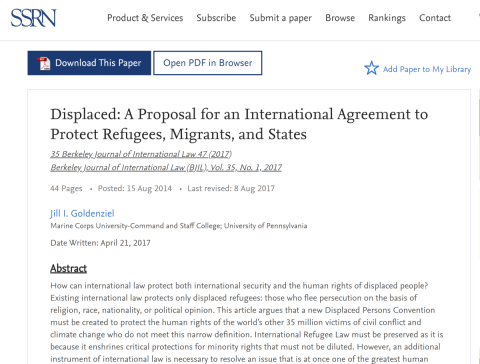Knowledge Platform
Displaced: A Proposal for an International Agreement to Protect Refugees, Migrants, and States
How can international law protect both international security and the human rights of displaced people? Existing international law protects only displaced refugees: those who flee persecution on the basis of religion, race, nationality, or political opinion. This article argues that a new Displaced Persons Convention must be created to protect the human rights of the world’s other 35 million victims of civil conflict and climate change who do not meet this narrow definition. International Refugee Law must be preserved as it is because it enshrines critical protections for minority rights that must not be diluted. However, an additional instrument of international law is necessary to resolve an issue that is at once one of the greatest human rights issues of our time and a threat to international peace and security. To support this argument, this article presents a comprehensive history of refugees in international law, combining primary sources and original interview data to trace how states have agreed for centuries that refugee law should protect minority rights, even as shifting state interests have changed refugee protection over time. This article refutes other scholarly proposals and UN practices that expand the category of “refugee.” It also contributes to growing scholarly interest in the history of human rights law by arguing that refugee law predates the modern human rights regime, challenges its foundations, and extends its claims to universality.
